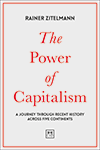The case for freer markets
Book review: The Power of Capitalism Rainer Zitelmann looks at multiple case studies to make his point about the superiority of markets.

Get the latest financial news, insights and expert analysis from our award-winning MoneyWeek team, to help you understand what really matters when it comes to your finances.
You are now subscribed
Your newsletter sign-up was successful
Want to add more newsletters?

LID Publishing, £19.99
Disillusion with capitalism has never been greater. Even American politicians are talking about increasing tax rates to 70% (see page 42). German academic Rainer Zitelmann thinks critics of capitalism overlook the extent to which free markets have generated prosperity. His book looks at multiple case studies to make his point about the superiority of markets.
Try 6 free issues of MoneyWeek today
Get unparalleled financial insight, analysis and expert opinion you can profit from.

Sign up to Money Morning
Don't miss the latest investment and personal finances news, market analysis, plus money-saving tips with our free twice-daily newsletter
Don't miss the latest investment and personal finances news, market analysis, plus money-saving tips with our free twice-daily newsletter
Some cases involve direct comparisons between various neighbouring countries with different economic systems (West Germany and East Germany, North and South Korea). Others examine the effects of economic reforms, such as those in China since 1978 and in Britain and America in the 1980s.
He also looks at why development aid in Africa has been such a failure and whether the financial crisis was the fault of too little or too much regulation. The book then concludes with a look at why intellectuals tend to dislike capitalism and a call for greater economic liberalisation.
The book is well written and gives a good, concise summary of the case for freer markets. However, even the examples Zitelmann cites suggest there is a difference between direct state intervention in industry, which is generally negative, and the state provision of welfare and public services, which, up to a point, doesn't seem to reduce growth that much.
Get the latest financial news, insights and expert analysis from our award-winning MoneyWeek team, to help you understand what really matters when it comes to your finances.

-
 Do you face ‘double whammy’ inheritance tax blow? How to lessen the impact
Do you face ‘double whammy’ inheritance tax blow? How to lessen the impactFrozen tax thresholds and pensions falling within the scope of inheritance tax will drag thousands more estates into losing their residence nil-rate band, analysis suggests
-
 Has the market misjudged Relx?
Has the market misjudged Relx?Relx shares fell on fears that AI was about to eat its lunch, but the firm remains well placed to thrive